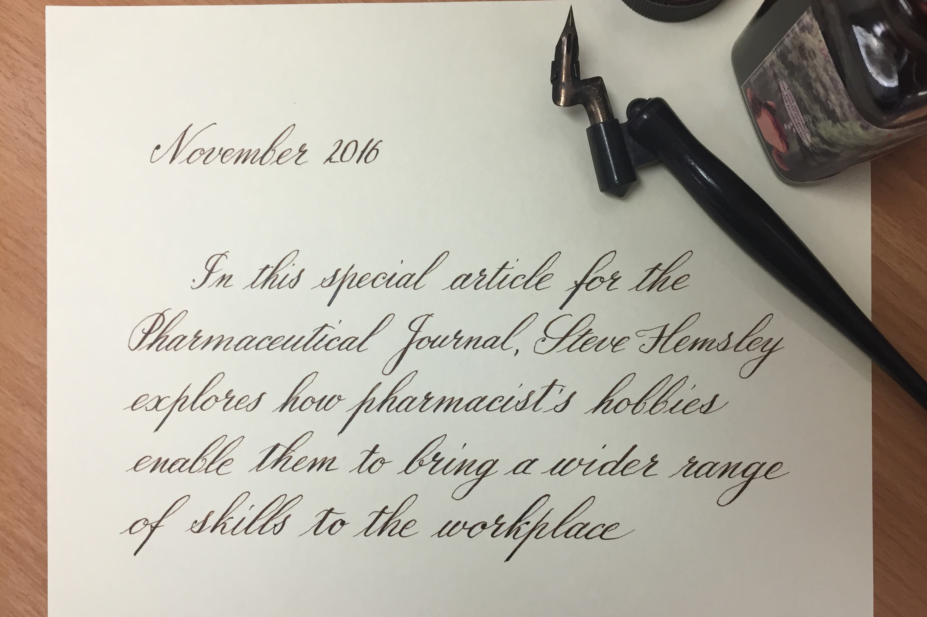
Courtesy of Mark Borthwick
Whether it is amateur dramatics, coaching a kids’ sports team or mastering arts and crafts, pharmacists need hobbies to relax away from the stresses of the profession. In fact, pharmacists and their employers could actually benefit at work from the wide range of out-of-hours pastimes being enjoyed across the UK.
Most people mention their hobbies on their CV when applying for a job to make themselves sound more interesting, but once someone is hired these personal interests are often ignored. Researchers from San Francisco State University in California claims this is a mistake because after-work hobbies — especially creative ones — can boost someone’s productivity.
Their report claims an employee who engages in a creative interest in their spare time can be a better problem solver during the day. All hobbies are also an opportunity for pharmacists to learn something new about themselves, and this can boost personal confidence.
Here, eight pharmacists explain how their hobbies help them at work.
Come fly with me
Andrew McCoig, chief executive of the Croydon and Merton, Sutton and Wandsworth Local Pharmacy Committees, loves to fly planes in his spare time and has completed almost 1,200 hours of flying. He says being in the air has many similarities with community pharmacy.

Source: Courtesy of Andrew McCoig
Andrew McCoig was introduced to flying in 1974 at the age of 26 by a pharmacy customer who flew Hawker Hurricanes during the Second World War
“Both are very unforgiving environments if you get it wrong. Malpractice or a lack of judgement could be fatal,” he says. “It is therefore essential that you are both fit for purpose and fit for practice in every sense to undertake either professional task.”McCoig was introduced to flying in 1974 at the age of 26 by a pharmacy customer who flew Hawker Hurricanes during the Second World War. “He thought it could be my way of diversifying into another skill which is also linked to another professional ability,” McCoig explains.
The emphasis on flight safety has also helped McCoig during his pharmacy career, he says. “Safety is in the planning around weather and navigation, just as safe pharmacy practice requires vigilance and updated knowledge of the drugs supplied and the patient’s condition.
“Both professional competencies are regularly checked, although, as a pilot, these checks have been in place long before any continuing professional development or mandatory competency checks were introduced in the pharmacy profession.”
Back to school
Katherine Delargy is deputy chief pharmacist at Barnet, Enfield and Haringey Mental Health NHS Trust and is also a school governor for a secondary school. Both roles have improved her pharmacy management, budget control and governance skills, as well as her teaching and learning abilities.
We look out for the children just like we look out for patients in the NHS
“In terms of my NHS role, it gives me another perspective,” she says. “I have a deeper appreciation of safeguarding and can see social determinates of both health and educational success in action. I appreciate the importance of oversight and how meetings and committees must be worthwhile, effective and must ask the right questions.”
Delargy adds that her pharmacy work also helps the school. “The school has a multi-million pound turnover and needs to set and maintain a balanced budget in an era of funding cuts and increased demand, change is a constant feature, curricula are altered according to government policy and children and teachers just have to adapt. We look out for the children just like we look out for patients in the NHS.”
Delargy says getting to know the other governors has also improved her professional network in local government and business.
It’s behind you!
It is pantomime season and Sandra Melville, a pharmacist at Lorn & Islands Hospital in Scotland, has written and directed staff pantomimes since 2004.
The pantomime is great for team building and for breaking down barriers
The productions take place every two years with a cast of about 20 people recruited from across the hospital. The 2015 production was ‘Aladdin’ and plans are in full swing for ‘Robin Hood and the Brexiteers’, which takes place on 4 February 2017.

Source: Courtesy of Sandra Melville
The 2015 pantomime at Lorn & Islands Hospital in Scotland was Aladdin
“The pantomime is great for team building and for breaking down barriers because there is a staff hierarchy in hospitals,” says Melville. “Morale gets a boost because this is so much fun and those in the cast get to mix with people they would not normally cross paths with.”
Melville says humour and satire is a way of expressing the increasing frustrations felt by NHS staff. “As you can imagine, management, government and bureaucracy bear the brunt of many jokes.”
For instance, the outlaws in Robin Hood steal £350m to help fund the NHS and the script makes fun of NHS acronyms and jargon, including RPTW (Rapid Process Improvement Workshop). “For the panto we have changed it to Robbing People in The Woods. We also have COW (Computer On Wheels) so, yes, there is a pantomime cow on stage.” The pantomime is for one night only and is free, but members of the 250-strong audience are asked to make donations.
Sail away
For ten years, Tim Root has made intricate model 18th century sailing ships. During the day, he is a specialist technical and governance pharmacist for the NHS Specialist Pharmacy Service, but he finds making models therapeutic after a busy day in the pharmacy.

Source: Courtesy of Tim Root
Pharmacist Tim Root finds building model sailing ships therapeutic
“The benefit to my work is that it has taught me patience and how to deal in small chunks with something that might appear difficult,” he says. “It’s also helped me to pay attention to detail. Perhaps it satisfies my obsession with detail that afflicts most pharmacists.”
Hole in one
Coaching young people to play golf has taught community pharmacy owner Gary Dobinson that constantly giving people instructions and trying to micro-manage them can have a negative impact.
Everyone needs to share their out-of-work abilities because you never know what might be useful
Dobinson runs Mills Pharmacy in the North East of England and says working with other coaches has helped his teaching and management style. “When you are coaching people there is a temptation to keeping telling them what to do and when you run a pharmacy the same can be true. You need to invest well in the time you spend with people who are learning — and be patient.”
Dobinson would like to know more about his own staff’s skills and hobbies to assess what transferrable talents could benefit his business. “Everyone needs to share their out-of-work abilities because you never know what might be useful.”
Seal the deal
Roz Gittins volunteers for the British Divers Marine Life Rescue charity which helps seals, dolphins and whales in distress around the UK.

Source: Courtesy of Roz Gittins
Roz Gittins volunteers for the British Divers Marine Life Rescue charity which helps seals, dolphins and whales in distress around the UK
Her day job is associate clinical lead pharmacist (south west and mental health) at third sector organisation Addaction and receives alerts when an animal is in distress nearby. “This gets the adrenaline going. It’s like being the on-call pharmacist for a busy hospital,” she says.
She says there are other similarities between working for the charity and the pharmacy. “Assessing and rescuing marine mammals requires decisions to be made quickly and often under pressure, which are skills that can be applied when working in a busy dispensary,” says Gittins. “While they may look cute, seals can deliver nasty bites and marine mammals can carry zoonotic diseases. I apply my knowledge of basic infection control measures gained while working in aseptics and offering services such as needle exchange.”
Gittins adds that there are times when prompt risk assessments, including looking out for the welfare of others, have to be made. “This experience has been similarly useful when supporting people with mental health problems who may present with challenging behaviours.”
The write stuff
Consultant pharmacist Mark Borthwick is using his calligraphy skills at Oxford University Hospitals NHS Foundation Trust.
He mastered writing script using copperplate nibs and ink while studying pharmacy. Today he is often asked to write certificates for nurses who have completed the foundation course in critical care, as well as birthday cards and the occasional wedding invitation.
“I bought the nibs, ink and a book to learn script during my pharmacy degree when I got bored with all the revising,” he says. “I used to practise my writing on pharmacy orders and I learnt different styles. It became my handwriting and attracted attention at work. It could become a second business in future but for now I am happy to write certificates and cards for colleagues.”
A stitch up
Heather Walker, chief pharmacist at North East London Foundation Trust NHS Foundation Trust, attends a sewing club and says there are many parallels with pharmacy.

Source: Courtesy of Heather Walker
Chief pharmacist Heather Walker attends a sewing club, which has helped her to be more patient
“However good I get there are always things I can learn and continue to improve,” she says. “When I make mistakes I learn from it before the next project. I am also encouraged to stretch myself in the club and come out of my comfort zone. It is important to have the confidence to do this at work too.”
You do not always have to stick to a rigid pattern when sewing… I apply this principle when training staff
Walker says sewing has improved her patience in pharmacy because she is naturally eager to get things done quickly. “It has taught me to read instructions fully before starting and that sometimes you have to take a step back and undo what you have done to get a better result in the long run,” she says.
The sewing club has also helped Walker manage the pharmacy training plan more effectively. “You do not always have to stick to a rigid pattern when sewing. If things change you need to be able to re-evaluate your end goals. I apply this principle when training staff. Someone might not be as quick as I thought they would be at understanding something, so the training schedule I devised for them might need some flexibility.”
The club has also improved her softer management skills. “It has taught me that when people are new to a team it doesn’t mean they do not have great ideas from day one. This is true in the pharmacy in the same way a new member of our sewing club might suggest new patterns or colours.”
References
You may also be interested in

Preparing for the GPhC registration exams: how to revise learning outcomes relating to clinical knowledge and therapeutic approaches

Antipsychotic drugs in dementia treatment associated with range of adverse reactions
